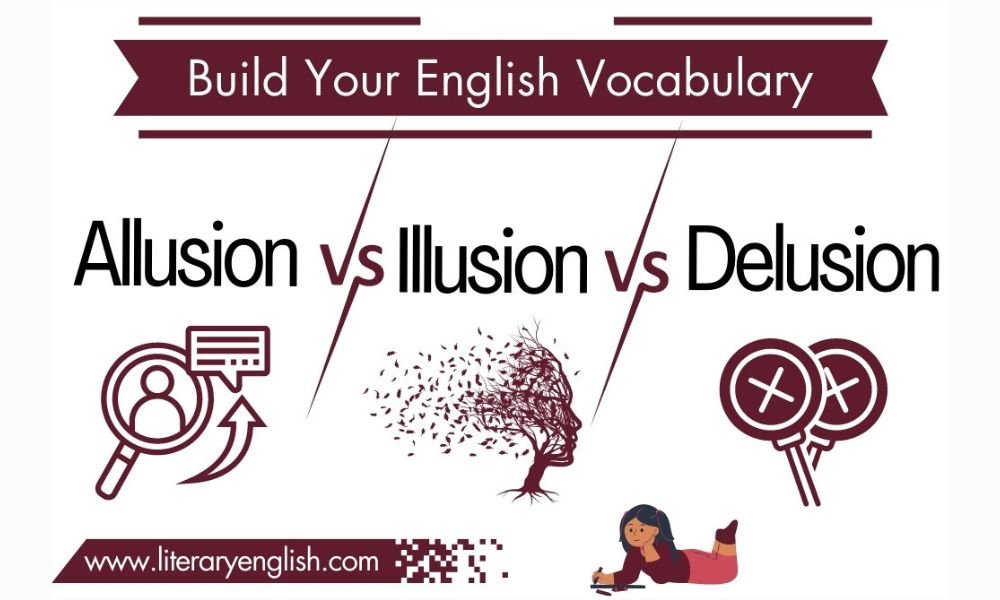Illusion, allusion, and delusion are three words that are often used interchangeably but have different meanings. These words are frequently used in English writing and they can easily confuse a writer or a reader if used wrongly. In this article, we will discuss the difference between illusion, allusion, and delusion in English writing.
Importance of Understanding the Difference between Illusion, Allusion, and Delusion
Understanding the difference between illusion, allusion, and delusion is important for effective communication and clear writing. Using these terms correctly can enhance the clarity and depth of your writing. If a writer uses them incorrectly in a sentence, it can cause confusion and misinterpretation. So, it is very essential to know the correct use to make your writing vivid and meaningful.
Illusion in English Writing
Illusion refers to a false perception or belief about something. In English writing, illusions can be visual or literary.
Visual Illusions: Visual illusions are false perceptions of reality that are created by the mind. They occur when the mind interprets visual information incorrectly. Visual illusions can be created through the use of colors, shapes, patterns, and other visual stimuli.
Literary Illusions: In literature, illusions refer to a reference made to a person, place, event, or piece of literature that is not explicitly mentioned. These allusions can be used to create deeper meaning or symbolism in a work of literature.
Example of Illusion in Sentence
The mirage on the desert was just an illusion, but it looked so real.
Allusion in English Writing
Allusion, on the other hand, refers to a reference made to something or someone that is not directly mentioned. It is an important literary device used by writers to enrich their writing. It adds depth and meaning to a work by referencing something outside of the text. An allusion can be direct or indirect, and it can refer to anything from a historical event to a popular culture reference. There are several types of allusions in English writing, including historical, biblical, mythological, and literary allusions.
Example of Allusion in Sentence
The author’s reference to the Trojan War in the novel was an allusion to the theme of betrayal.
Delusion in English Writing
Delusion is a false belief that is held despite clear evidence to the contrary. In English writing, delusions can be used to create tension or conflict in a character or story. There are several types of delusions, including paranoid delusions, grandiose delusions, and somatic delusions. These delusions can manifest in a character’s beliefs or actions, and they can be used to create conflict or tension in a story.
Example of Delusion in Sentence
The character’s belief that he is a superhero despite having no special powers is a delusion.
How to Differentiate Illusion, Allusion, and Delusion?
To avoid confusion between illusion, allusion, and delusion in English writing, it is essential to understand their meanings and how they are used in context. The main difference between illusion, allusion, and delusion is that illusion refers to a false perception, allusion refers to a reference made to something outside of the text, and delusion refers to a false belief that is held despite clear evidence to the contrary. It is also important to use them correctly in writing, as using them interchangeably can cause confusion and misinterpretation.
Conclusion
In conclusion, illusion, allusion, and delusion are essential terms in English writing, but they have different meanings and usage. Illusion refers to a false perception or belief, allusion refers to a reference made to something outside of the text, and delusion refers to a false belief that is held despite clear evidence to the contrary. Understanding the difference between these terms is important for effective communication and clear writing.
Frequently Asked Questions
What is the difference between illusion and delusion?
The main difference between illusion and delusion is that illusion refers to a false perception or belief, while delusion refers to a false belief that is held despite clear evidence to the contrary.
What is an allusion in writing?
An allusion in writing is a reference made to something or someone that is not directly mentioned in the text.
How can I avoid confusion between illusion, allusion, and delusion in my writing?
To avoid confusion, it is essential to understand the meanings of these terms and how they are used in context. It is also important to use them correctly in writing and not interchange them.
Can allusions be indirect?
Yes, allusions can be both direct and indirect.
Why is understanding the difference between illusion, allusion, and delusion important in writing?
Understanding the difference between these terms is important for effective communication and clear writing. Using them correctly can enhance the clarity and depth of your writing, while using them incorrectly can cause confusion and misinterpretation.
